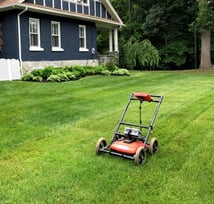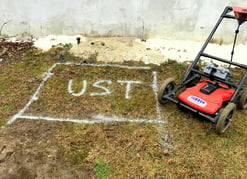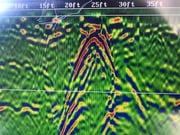Have you ever gone to the beach and used a metal detector and found pennies, nickels or dimes? Or even paper clips maybe a thumb tack or that gold chain? Did you really ever find that diamond ring or that emerald necklace that would be like winning the lottery? I didn’t think so. That’s what it’s like using a metal detector to find an Underground Storage Tank (UST). There are so many different metal detectors available for anyone to buy today. It’s like hiring someone with an $800 metal detector who will charge you $200 to find a penny. Is that what you are looking for?
What do the following items have in common: A/C units, chain-link fence, reinforce concrete and underground utilities? They all contain metal. The major problem with only using a metal detector to locate tanks is that all homes have a large amount of metal surrounding the structure.
There have been many instances where Curren Environmental has been called out to a property after a “metal detector tank scan” had been performed because the findings were inconclusive. In most cases the recommendations of the tank scan company was to either dig it up or have a GPR scan performed! One severe case for example – a homeowner purchased a property after having a metal detector scan performed and was now looking to sell. A potential buyer of the property had Curren perform a GPR scan and sure enough a UST was found. The UST was removed and found to be leaking—the cost of the remediation was over $20,000.00. Don’t buy a home with an UST that couldn’t be found with a metal detector.
Ground Penetrating Radar is (commonly called GPR) a geophysical method for tank scans that has been developed over the past thirty years for shallow, high-resolution, subsurface investigations of the earth. A Ground Penetrating Radar (tank scanning) unit costs well over $15,000, which a trained technician uses to locate an Underground Oil Tanks.

GPR uses high frequency pulsed electromagnetic waves (generally 10 MHz to 1,000 MHz) to acquire subsurface information to locate the Underground Oil Tank. Energy is propagated downward into the ground and is reflected back to the surface from boundaries at which there are electrical property contrasts.
The GPR unit is mounted on a cart that is manually pushed. The use of GPR is based on a radar signal penetrating the ground and the signal reflecting off solid buried objects such as Underground Oil Tanks. The signal will attenuate when it passes over solid ground cover such as concrete, asphalt, pavers, etc. Optimal scanning conditions would be unpaved non-landscaped areas. A metal detector will pick up any rebar in the concrete or pavement.

Ground penetrating radar (commonly called GPR) is a geophysical method that has been developed over the past thirty years for shallow, high-resolution, subsurface investigations of the earth. GPR uses high frequency pulsed electromagnetic waves to acquire subsurface information. The tank scanning unit also provides the ability to scan the ground for not only copper lines, cables and pipes but the advantage over a traditional, metal detector or magnetometer is that it can see non-conductive materials including plastic pipes.
Using radar technology, the displays shows image map of underground features. The unit allows real-time subsurface displays and adjustable digital color to provide immediate sensing technology in lieu of data capturing and downloading to observe the findings as with other GPR units. Something you WILL not see with a metal detector.

Remember – a metal detector can find anything metal in the ground. A Ground Penetrating Radar will scan the ground for an Underground Oil Tank.


